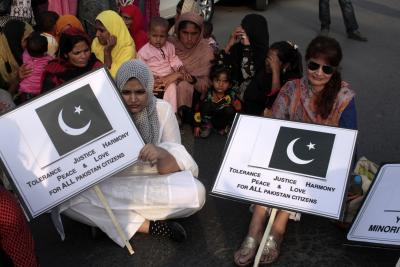Pakistani State's complicity in persecution of minorities needs to be confronted: Report
By IANS | Updated: October 14, 2025 21:20 IST2025-10-14T21:15:46+5:302025-10-14T21:20:19+5:30
Washington, Oct 14 Pakistan has been facing a deepening crisis of religious intolerance and systemic persecution. Despite international ...

Pakistani State's complicity in persecution of minorities needs to be confronted: Report
Washington, Oct 14 Pakistan has been facing a deepening crisis of religious intolerance and systemic persecution. Despite international criticism and repeated calls for reform, Pakistan's inability to protect its most vulnerable citizens has led to a trail of shattered lives, desecrated places of worship, and a society increasingly fractured by hate, a report detailed on Tuesday.
The Pakistani State's complicity in the persecution of Hindus, Christians, Ahmadis, Shia Muslims, and Sikhs in Pakistan, and critical journalists needs to be seriously confronted, Uzay Bulut, a Turkish journalist and a Senior Fellow at Gatestone Institute, wrote in an article for the US-based think tank.
"Pakistan has for years been seriously repressing its minorities, political dissidents, human right advocates and journalists – even transnationally. Nevertheless, Pakistan continues to enjoy the benefits of the European Union's special incentive arrangement under its Generalized System of Preferences (GSP+). The contradiction was highlighted once again at the United Nations.
"As a part of the ongoing 60th session of the United Nations Human Rights Council (UNHRC), the international NGO CAP Freedom of Conscience collaborated with the news outlet EU Today through a side event on October 1. This event called upon the EU to review Pakistan's GSP+ status in light of its long-term state-sanctioned human rights violations," wrote Bulut.
On September 30, Baloch human rights defender Joshua George Bowes voiced concerns over Pakistan's failure to uphold its international human rights obligations while continuing to benefit from the EU's GSP+ trade status. Citing the International Federation of Journalists' South Asia Press Freedom Report 2024–25, Bowes said that journalists in Pakistan faced 34 serious press freedom violations, including seven targeted killings and eight non-fatal attacks, ranking Pakistan at 158th spot on the World Press Freedom Index.
The report said, "Pakistan is engulfed in a deepening crisis of religious intolerance and systemic persecution. This year has witnessed a disturbing surge of violence, discrimination and institutional complicity. Christian, Ahmadiyya and Hindu communities have particularly been targeted."
In September, the Pashtun National Jirga said that over 4,000 Pashtuns are missing. Similarly, the Ahmaddiya community which has a population of around 500,000 in Pakistan has been subject to systemic discrimination. Although Ahmadis consider themselves Muslim, however, a 1974 amendment to Pakistan's constitution declares them non-Muslims.
The Gatestone Institute report added: "The persecution of Hindus in Pakistan has also intensified. On September 17, 2024, the Hindu Rama Pir Temple in Sindh province was attacked by armed terrorists who indiscriminately fired at worshippers, wounding four people. Such attacks on Hindu places of worship are alarmingly frequent. The climate of impunity only encourages deep-seated hostility toward religious minorities.
"Forced conversions and underage marriages of Hindu and Christian girls have also surged. Each year in Pakistan, more than 1,000 Christian and Hindu girls, typically between 12 and 25 years, are kidnapped, forced to convert, and married off to Muslim men. Women and children from religious minorities are at high risk of kidnapping, forced conversion and forced marriage. Forced conversion to Islam is not illegal in Pakistan. The authorities rarely take any meaningful action to bring perpetrators to justice, and the police are often refuse to file complaints submitted by the victims or their families," it added.
The international community has expressed concern over Pakistan's failure to protect minorities in the country. The United Nations and several nations have slammed the Pakistani government over its inaction on the issue and demanded urgent reforms. Despite the repeated calls, meaningful change is nowhere in sight.
"The Pakistani state's complicity in the sustained persecution of Hindus, Christians, Ahmadis, Shia Muslims, and Sikhs in Pakistan, as well as critical journalists, whether through silence, legal endorsement, or active participation, needs to be seriously confronted," wrote Bulut.
Disclaimer: This post has been auto-published from an agency feed without any modifications to the text and has not been reviewed by an editor
Open in app